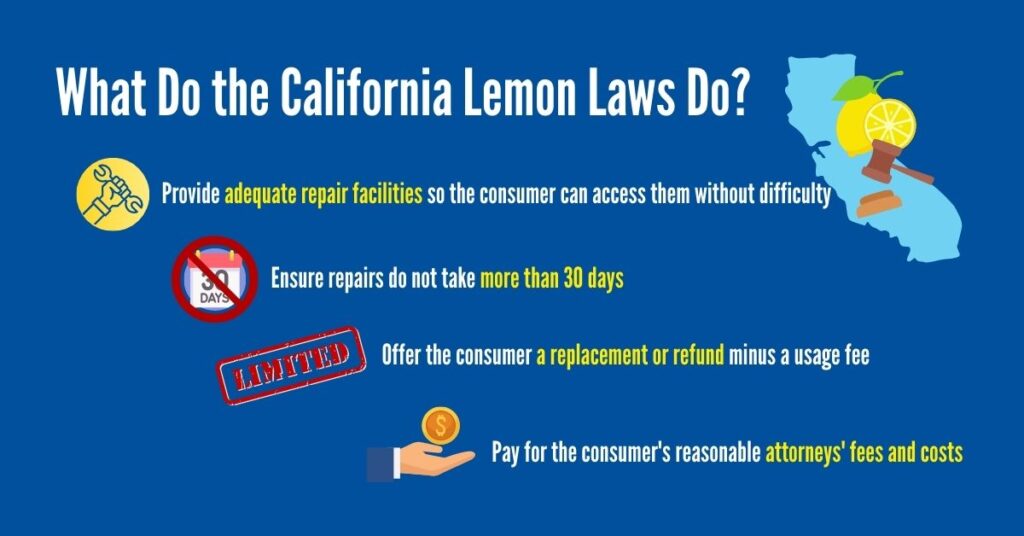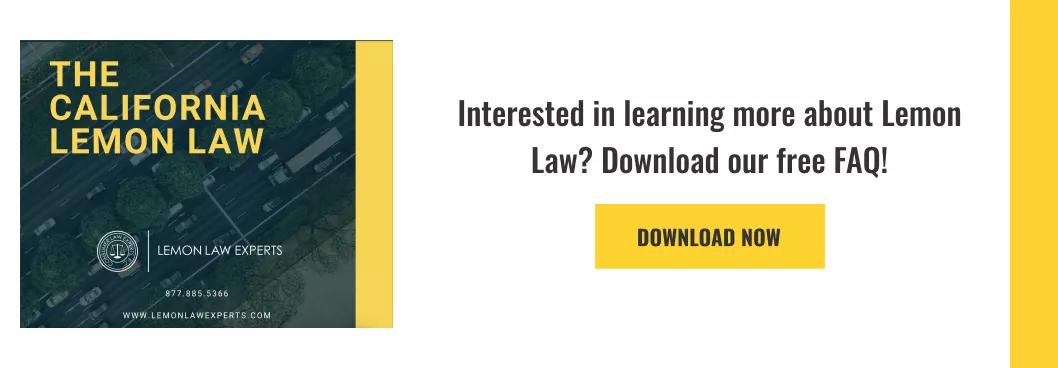California Lemon Laws Provide Protection to Consumers for Defective Products
If you have purchased or leased a car in California and end up in the repair shop for repeated problems, the California lemon laws may help you get your money back. Many of us seek the best bargains when it comes to purchasing consumer goods to meet our everyday needs.
Unfortunately, some of these products are defective and fail in a very short period of time. Over 150,000 vehicles sold every year in California are lemons. If you feel that your vehicle is a lemon, do not give up! You have rights!
In California and in most other U.S. states, consumer protection laws provide remedies for those of us who have purchased or leased consumer products that fail to perform. In California, these are the California Lemon Laws.

The Lemon Law Basics
You may be aware that you have rights when purchasing a vehicle with a warranty. But you may be wondering, How does the lemon law work in California?
The California Lemon Law provides protection for consumer goods that are purchased or leased for personal, family, or household use. The California lemon law applies to most consumer goods, except for clothes and consumable goods, such as fruits, vegetables, cosmetics, and over-the-counter drugs.
In California, if a manufacturer cannot repair a consumer good after a reasonable number of repair attempts, then it must either replace or refund the consumer’s money for the defective product.
The lemon car law in California applies explicitly to vehicles with existing warranties.
CA lemon law rules generally cover many types of vehicles, including:
- Cars,
- Pickup trucks,
- Vans,
- SUVs, and
- Motorcycles.
The lemon law also covers the chassis, chassis cab, and drivetrain of a motor home. The lemon law covers leased vehicles, pre-owned vehicles, and financed vehicles. The lemon car law in California covers both new and used vehicles under warranty.
What Do the California Lemon Laws Do?
The California lemon laws mandate that the manufacturer of consumer goods:
- Provide adequate repair facilities in California so that the consumer can access the necessary facilities without difficulty
- Ensure that repairs to the defective goods do not take more than 30 days
- Only be allowed a certain number of repair attempts to fix the defective product
- Offer the consumer a replacement or a refund minus any trouble-free use value
- Pay for the consumers’ reasonable attorneys fees and costs
California’s vehicle lemon laws protect consumers who have purchased or leased warranted new and used motor vehicles.
If a manufacturer or seller of a warranted vehicle is unable to repair the vehicle in a reasonable number of repair attempts, then it must repurchase or replace the vehicle, pay for the consumer’s incidental and consequential damages and pay for the consumer’s reasonable attorneys fees and costs.
What amounts to a reasonable number of attempts varies and depends on the seriousness of the defect. Generally, safety-related defects will require fewer repair attempts than those defects that are not safety-related.
What Counts as a “Lemon” Under the Lemon Car Law in California?
What counts as a lemon under the lemon law in California depends on the circumstances.
You must meet several requirements for your vehicle to qualify as a lemon, including:
- Existing warranty. The vehicle must have been purchased with an express and active warranty.
- Purchase from dealer or manufacturer. The lemon law covers “consumer goods,” not cars purchased from private parties.
- Reasonable amount of attempted repairs. The manufacturer or dealer has to have been given the opportunity to attempt to repair the vehicle on several occasions.
- Material defect. The problem with the vehicle must be considered material, meaning that it substantially alters the vehicle’s ability to function.
Additionally, the defects cannot result from regular wear and tear or the owner’s failure to maintain the vehicle properly. Consult with an experienced attorney if you are not sure if your vehicle defect counts under the lemon law in California.
Is Your Vehicle a Lemon Quiz?
Not sure if your vehicle is a lemon? Take this short quiz to find out if your vehicle might qualify as a lemon.
*Please note that this quiz is for informational purposes only and should not be considered legal advice. To determine if your vehicle qualifies as a lemon under California law or any other jurisdiction, consult with an attorney familiar with lemon law cases.
Our Rights as Consumers
We as consumers are often unsure of our rights when it comes to the purchasing of defective goods.
Some of us may be so uncertain that we simply throw the product away and buy a replacement at our own cost and blame ourselves for not choosing well in the first place. The California Lemon Laws are here to protect us from defective products and provide us with monetary compensation.
The California lemon laws provide the following types of remedies to lemon vehicle owners:
- Repurchase of the defective car (refund of all monies spent towards the car minus the trouble-free use-value); or
- Replacement of the defective car; or
- Cash settlement; and
- Payment of the consumer’s reasonable attorneys fees and costs
Additionally, if an automobile manufacturer willfully violated California’s lemon law, then a vehicle owner may be able to recover civil penalties against the automobile manufacturer.
The civil penalties can be as much as two times the amount of the actual damages. An attorney can help you better understand whether the automobile manufacturer of your car willfully violated the law in your case.
How Does the California Lemon Law for a New Car Work?
When you buy a new car from the dealership, the last thing that you want to worry about is whether it will be a lemon. You should, however, keep a record of your new car’s warranties.
As mentioned above, a car must have an existing warranty to be covered by the California lemon law.
It’s a good idea to bring your new vehicle to the dealer or an authorized manufacturer repair shop while it is under warranty if it is experiencing issues. Be sure to tell them about all the problems with your vehicle. Check that these issues are all on your service order.
Suppose the car ends up having excessive problems or is defective. In that case, the automobile manufacturer will not be able to argue that you took the car to a dealer that is not certified to handle its vehicles or otherwise caused the problem.
The dealer is not on your side. If the problems with your new car keep adding up, the dealer may make excuses or try to blame you. Consult with a lemon law attorney if your new vehicle is causing you more grief than enjoyment.
Is a Used Car Covered by the Lemon Law in California?
Many people do not have the money to buy a brand new vehicle. Do not fret about purchasing a used vehicle. There is a lemon law in California for a used car to protect consumers of pre-owned vehicles.
Figuring out what is the lemon law in California when it comes to a used car requires special considerations. The used vehicle must still be under warranty to be covered by California’s lemon law. The warranty can be the original warranty that came with the car when it was new.
The warranty may also be a new or extended warranty for a vehicle that has been certified. A certified pre-owned vehicle that you purchase from the dealer is an example of a covered vehicle under warranty.
Many used cars, however, have expired warranties. Be sure to request all warranty documents from the seller when you buy your used vehicle.
Additionally, vehicles sold privately by an individual rather than by a dealer are not covered by California’s lemon law. It doesn’t matter if the vehicle still has a warranty. The law covers only consumer goods, and unfortunately, this excludes vehicles sold in a private sale by an individual.
What Is the Time Limit for Filing Under the Lemon Law in California?
There is a time limit for every type of claim under the law by which you must file your case. California lemon law has a couple different time limits you will need to keep in mind.
First, the issues with your vehicle must have occurred during the warranty period. Unfortunately, if the issue or problem occurs after the warranty period, you likely do not have a claim under the lemon law.
Second, the California lemon law rules have a statute of limitations for filing a claim. Under the lemon law statute of limitations, you generally must file your court complaint within four years of discovering the defect.
Even though you have four years to file a complaint, you shouldn’t wait until the last minute. You may want to consult with an experienced lemon law attorney as soon as you suspect that your vehicle is defective.
What Should I Do If I Think I Have a Lemon Vehicle?
If you suspect that your car may be a lemon, you can take certain steps to help you with a potential lemon law claim.
Gather all records related to the dealer’s attempted repairs of your vehicle. Review these documents to ensure that all the issues you raised are noted.
Then, contact an experienced lemon law attorney. Trying to figure out what is the lemon law in California and how it may affect your situation can be overwhelming.
Fortunately, California’s lemon law makes the automobile manufacturer responsible for paying for a buyer’s attorney fees in a lemon law case.
Contact an Experienced California Lemon Law Attorney
If you or any member of your family, have purchased or leased a defective vehicle or other consumer product and the seller or manufacturer is not prepared to cooperate when it comes to offering a refund or replacement, then you should be contacting a “California Lemon Laws” attorney, who will evaluate your situation and provide you with a comprehensive evaluation of your claim.
Do not get discouraged if your consumer goods fail to conform to your expectations. Rather, make sure to protect your rights and receive the proper remedies that you are entitled to under California’s lemon laws.
Contact the Lemon Law Experts of Consumer Law Experts, PC, today. We have aggressive and experienced lemon law attorneys who can help you understand whether your vehicle or consumer good is covered. Call us today for a free case evaluation.





